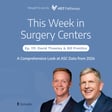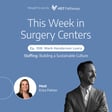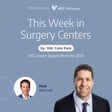
Maura Cash – Proactively Improving Your OAS-CAHPS Results
One of our favorite returning guests, Maura Cash, is here today to talk about OAS-CAHPS. There is a ton of OAS-CAHPS coverage right now across the industry, given the 2025 mandated deadline, but we'll cover a new angle with Maura: how you can proactively improve your scores before they become public by properly training your staff.
After my conversation with Maura, we'll switch to our Data & Insights segment. Today, we'll break down the average Patient Deposit Collection Rates that surgery centers are experiencing, and then I'll share some tips for how you can improve those collection rates.
Resources Mentioned:
Download HST’s State of the Industry Report to get your hands on even more data: https://www.hstpathways.com/resources/surgery-center-industry-report
Brought to you by HST Pathways.



















